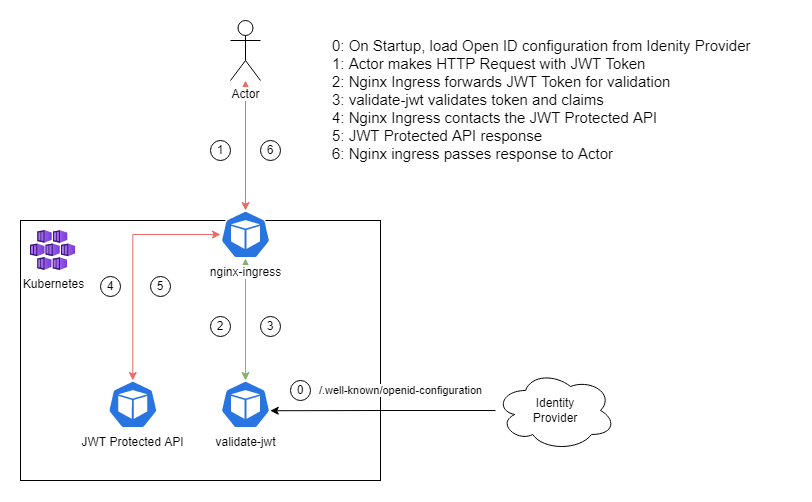This project is an API server which is used along with the nginx.ingress.kubernetes.io/auth-url annotation for ingress-nginx and enables per Ingress customizable JWT validation.
helm repo add ingress-nginx-validate-jwt https://ivanjosipovic.github.io/ingress-nginx-validate-jwt
helm repo update
helm install ingress-nginx-validate-jwt \
ingress-nginx-validate-jwt/ingress-nginx-validate-jwt \
--create-namespace \
--namespace ingress-nginx-validate-jwt \
--set openIdProviderConfigurationUrl="https://login.microsoftonline.com/common/v2.0/.well-known/openid-configuration"- openIdProviderConfigurationUrl
- OpenID Provider Configuration Url for your Identity Provider
- logLevel
- Logging Level (Trace, Debug, Information, Warning, Error, Critical, and None)
- Helm Values
apiVersion: networking.k8s.io/v1
kind: Ingress
metadata:
name: ingress
namespace: default
annotations:
nginx.ingress.kubernetes.io/auth-url: http://ingress-nginx-validate-jwt.ingress-nginx-validate-jwt.svc.cluster.local:8080/auth?tid=11111111-1111-1111-1111-111111111111&aud=22222222-2222-2222-2222-222222222222&aud=33333333-3333-3333-3333-333333333333
spec:The /auth endpoint supports configurable parameters in the format of {claim}={value}. In the case the same claim is called more than once, the traffic will have to match only one.
For example, using the following query string
/auth?
tid=11111111-1111-1111-1111-111111111111
&aud=22222222-2222-2222-2222-222222222222
&aud=33333333-3333-3333-3333-333333333333
Along with validating the JWT token, the token must have a claim tid=11111111-1111-1111-1111-111111111111 and one of aud=22222222-2222-2222-2222-222222222222 or aud=33333333-3333-3333-3333-333333333333
The /auth endpoint is able to query arrays. We'll use the following JWT token in the example.
{
"email": "[email protected]",
"groups": ["admin", "developers"],
}Using the following query string we can limit this endpoint to only tokens with an admin group
/auth?
groups=admin
The /auth endpoint supports a custom parameter called "inject-claim". The value is the name of claim which will be added to the response headers.
For example, using the following query string
/auth?
tid=11111111-1111-1111-1111-111111111111
&aud=22222222-2222-2222-2222-222222222222
&inject-claim=email
The /auth response will contain header email=[email protected]
The value should be in the following format, "{claim name},{header name}".
For example, using the following query string
/auth?
tid=11111111-1111-1111-1111-111111111111
&aud=22222222-2222-2222-2222-222222222222
&inject-claim=email,mail
The /auth response will contain header mail=[email protected]
Example Ingress
apiVersion: networking.k8s.io/v1
kind: Ingress
metadata:
name: app
annotations:
nginx.ingress.kubernetes.io/auth-url: http://ingress-nginx-validate-jwt.ingress-nginx-validate-jwt.svc.cluster.local:8080/auth?aud=11111111-11111-1111111111&inject-claim=https%3A%2F%2Fexample.com%2Fgroups,groups&inject-claim=scope
nginx.ingress.kubernetes.io/configuration-snippet: |
auth_request_set $groups $upstream_http_groups;
auth_request_set $scope $upstream_http_scope;
proxy_set_header JWT-Claim-Groups $groups;
proxy_set_header JWT-Claim-Scope $scope;Metrics are exposed on :8080/metrics
| Metric Name | Description |
|---|---|
| ingress_nginx_validate_jwt_authorized | Number of Authorized operations ongoing |
| ingress_nginx_validate_jwt_unauthorized | Number of Unauthorized operations ongoing |
| ingress_nginx_validate_jwt_duration_seconds | Histogram of JWT validation durations |



